

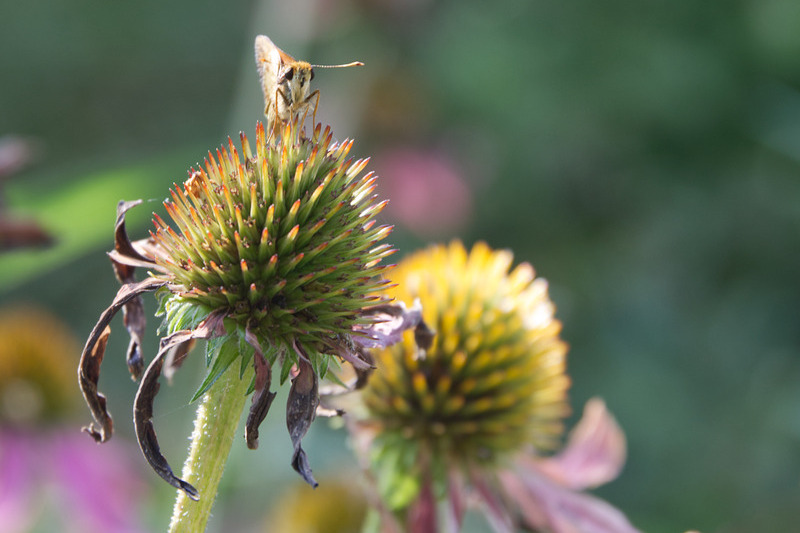
Leading the way in sustainability
Photos by Monica Moriak, Evan Krape and Maria Errico April 19, 2024
UD’s Office of Sustainability promotes environmental stewardship and sustainability from academic and operations perspectives
Making the world a more sustainable place — “meeting the needs of the present without compromising the ability of future generations to meet their own needs,” as the United Nations defines it — happens not through one big effort but instead through countless smaller acts done consistently over time, say the co-directors of the University of Delaware’s Office of Sustainability.
That has been the focus for Chris Williams, associate provost and academic director for the office, and Jeffrey Summerhays, director for sustainable operations. Universities have a responsibility to be a living learning community to advance and model positive changes for our future, they said. They are working throughout the University to advance sustainability in academic courses, research and operations.
Doing that work — as well as documenting it and raising awareness of it — helped UD climb about 200 places in the 2024 QS World University Rankings for sustainability compared to the previous year. UD is currently ranked 33rd in the United States and 240th globally out of nearly 1,400 universities.
UD’s sustainability efforts matter to students, too. The Princeton Review shared that almost 80% of prospective college students are interested in the sustainability efforts of colleges and universities.
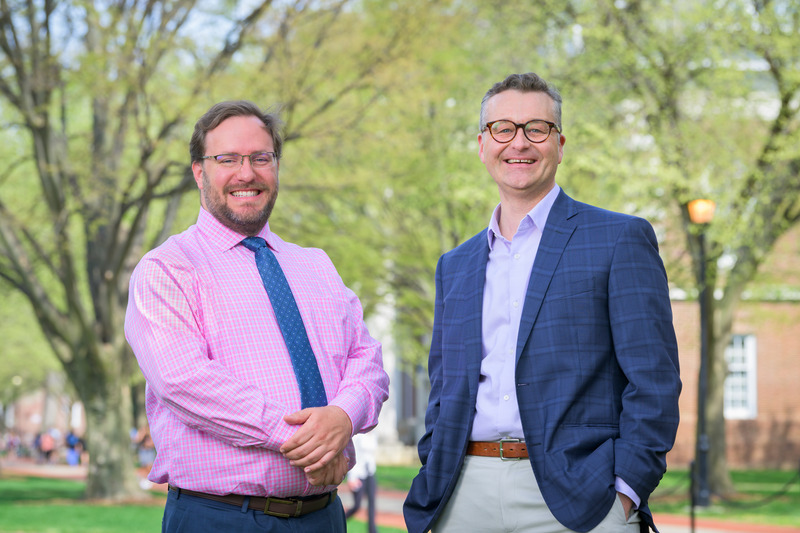
At UD, sustainability is a priority and creation of the Office of Sustainability was part of the institution’s “Forward & Forever” strategic plan.
The office addresses sustainability from both academic and operations perspectives. Both parts of the office have been diligently working to improve and broadcast UD’s sustainability efforts.
Advancing sustainability in classrooms and labs
UD’s long history of cutting-edge research, coupled with its burgeoning sustainability efforts, offers students an exceptional opportunity to solve sustainability challenges in innovative ways.
Continued advancement in sustainability can be found in classrooms and learning spaces of each of the eight colleges across campus, as well as in 23 of its research centers, and sustainability-related student organizations, events and workshops.
In April, the Faculty Senate approved a new course catalog designation for sustainability-related classes. Williams explained that a rubric was created based on the UN’s 17 sustainability development goals. It describes two types of courses — sustainable connections and sustainable investigations — that will help students pinpoint how in-depth they want to go.
“Sustainability connections will be for courses that bridge the gap between sustainability and a student’s area of interest through a lecture or assignment,” he said. “Sustainability investigation courses are more in-depth, and the topic of sustainability takes up a larger portion of the course.”
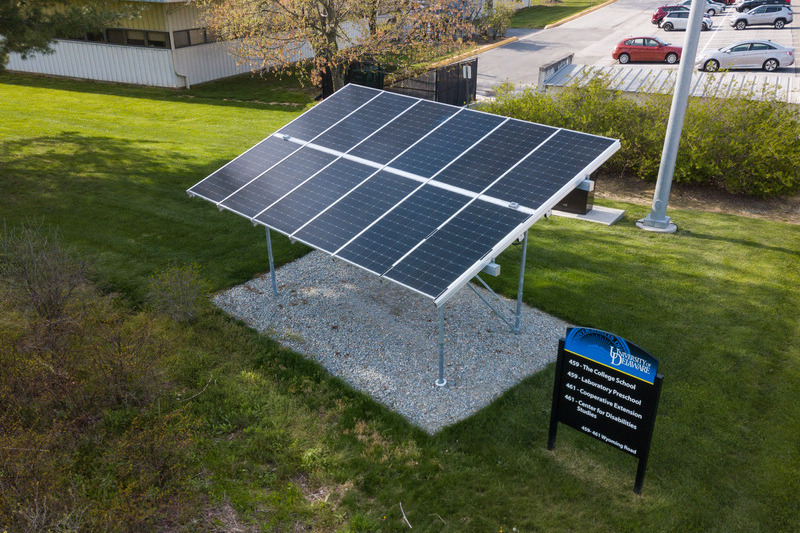
It is estimated that UD will be offering about 500 sustainability-related courses that students will be able to identify through the course catalog search function.
In fall 2024, the University Studies first-year seminar will also include a sustainability-specific module.
“The discussion will be as broad as ‘why should you care about sustainability and climate change’ to as detailed as to having specific ways students can engage in doing their part in the sustainability space including recycling and saving energy,” Williams said. “It is so valuable that all of the 4,000-plus freshmen will be exposed to this material and be engaged sustainable citizens at UD.”
There is also a sustainability certificate for graduate students who are interested in expanding their knowledge in sustainability.
In fall 2023, Carl Nelson-Poteet, a graduate student and one of the sustainability student fellows, suggested the use of Ecosia, a search engine powered by Bing. Ecosia pledges to plant trees with funds generated by its search engine advertisements in an effort to combat climate change and promote biodiversity.
In collaboration with UD’s information technology department, this initiative is being piloted by adding Ecosia as the default search engine to the computers managed by IT in the University’s computer labs. By the end of March 2024, there had been 25,000 Ecosia searches on UD computers, resulting in 500 trees being planted.
Making UD’s operations more sustainable
The commitment to operational sustainability is evident partly because of “hidden efforts” by Facilities, Real Estate and Auxiliary Services (FREAS), which manages UD’s buildings, grounds and more, Summerhays said. He credits the FREAS staff for their daily efforts to maintain, protect, operate and preserve UD's facilities in an efficient and sustainable way.
Procurement Services and FREAS have contributed to the increase of UD’s green purchases, which are safe for the Earth and lead to financial savings over time because of energy efficiency and reduced waste. The Environmental Health and Safety (EHS) team has a take-back program to properly dispose of items no longer in use.
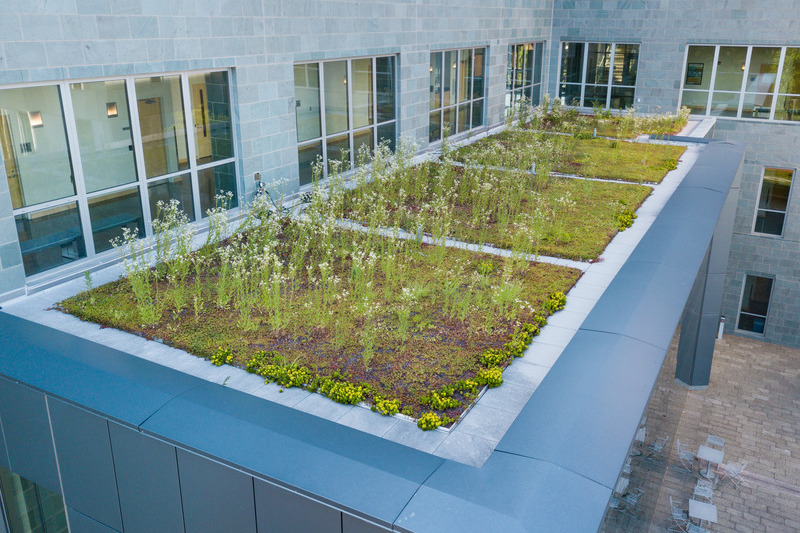
“Janitorial staff are using cleaning products, ranging from cleaning solutions to the paper goods used in every restroom, that are 60% green,” Summerhays said. He added that the University’s procurement team is always looking to purchase long-lasting, efficient items for use around campus.
The energy efficiency of campus buildings also relies on teamwork throughout UD.
“We have a sustainability engineering and energy team that actively monitors our power consumption and building energy consumption — something as simple as removing an excessive amount of energy-draining equipment — to keep our energy usage as balanced as possible,” Summerhays said.
There are simple, low-cost and low-energy ways that everyone can pitch in to lessen power consumption, reduce environmental pollution and conserve natural resources.
“UD students, faculty and staff can continue to help us by using the recycling bins around campus. Those items are sent to a recycling facility for processing instead of a landfill,” Summerhays said.
He suggested making recycling fun by challenging yourself to fill the bins with recyclable materials as quickly as possible.
Other small ways to have a large impact include turning off unnecessary lights, being mindful of the energy efficient operating temperatures in buildings – 68 in the winter and 76 in the summer – and wearing layers instead of adjusting the thermostat.
Whenever possible, UD students, faculty and staff can use campus transportation or bicycles instead of driving to multiple places on campus throughout the day.
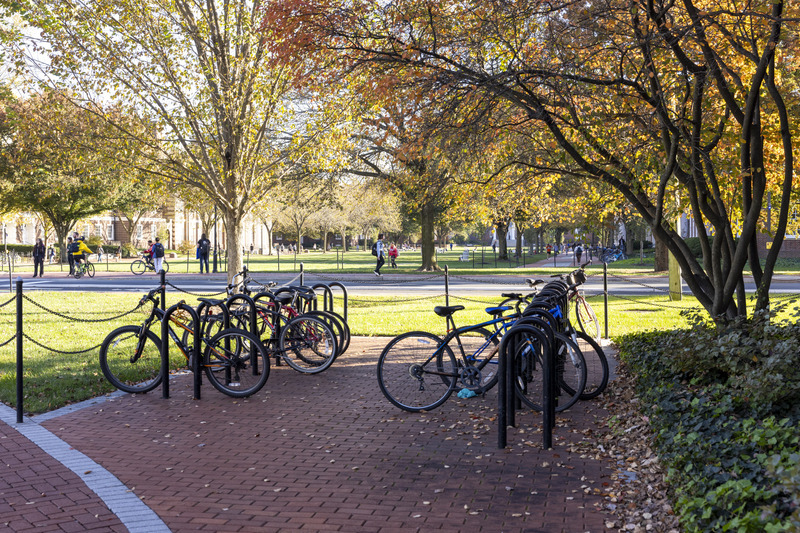
“Our buses transport an estimated half a million people per year,” said Summerhays. “Keeping such a large number of fossil-fuel-burning vehicles from driving throughout campus each day has helped to minimize environmental pollution.”
FREAS’s larger goal is for faculty, students and staff to consistently engage in sustainability efforts, Summerhays said.
“We work hard to work with the campus community to minimize our energy consumption,” he said.
Gauging whether the University is operating efficiently is done from an internal and external perspective. According to Summerhays, from an outside perspective, there are established organizations — Association for the Advancement of Sustainability in Higher Education (AASHE) and QS World University Ranking — that rate and rank the sustainability performance of higher education institutions. AAPA Leadership in Educational Facilities ratings are external as well but are specific to professional trades.
The Office of Sustainability is currently gathering information to submit the AASHE application. This meticulous process requires about 600 to 900 hours to complete, and it is calculated on a point system that ends in a ranking of platinum, gold, silver or bronze, according to Wiliams. UD’s last application was submitted four years ago and was ranked bronze.
Williams has his sights set on improving UD’s rankings.
“With the University’s new priority to be a leader in sustainability, I believe our many activities over the last two years will place us at a much higher ranking,” Williams said.
Students, faculty and staff can email the Office of Sustainability at sustainability@udel.edu to provide feedback, ideas and concerns.
Sustainability timeline
Sustainability initiatives have been at the forefront of the University for several years, positioning UD to continue to improve its sustainability rankings. Below are five of the many impactful FREAS sustainability initiatives since 2020.
2020
Wood chips replaced the use of mulch in planted areas on campus. All of the landscape wood chips are generated from campus arboriculture work or obtained for free from local tree companies. This reduces the burden on the city composting facility.
2021
Approximately 250 vacuums and 150 carpet extractors used by University custodians are green certified.
2022
Grounds purchased alternative-fuel equipment, which includes a propane mower and two battery-operated mowers. All string trimmers, hedge shears and blowers are battery-operated, along with several chainsaws and pole pruners.
2023
Food-waste composting began in October, with collection locations focused on food service facilities in Pencader, Caesar Rodney, Russell, Trabant and Perkins. In the first month of this program, UD diverted 34,400 pounds of food waste from the waste stream.
Transportation’s bus fleet served an average 500,000 riders yearly, saving approximately 300,000 pounds of carbon dioxide annually from entering the atmosphere.
Contact Us
Have a UDaily story idea?
Contact us at ocm@udel.edu
Members of the press
Contact us at 302-831-NEWS or visit the Media Relations website

